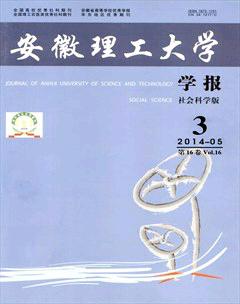基于AGIL模式下的城市社区文化建设
周学锋+繆保爱
摘 要:现代城市社区由于社会分工的高度发达,社区居民的异质性强,缺乏对社区的认同感和归属感,因此加强社区文化建设,对于增强社区居民的凝聚力,提升居民对社区的认同感和归属感具有重要的作用。依据AGIL模型理论,社区文化既是构成社区系统的一个重要子系统,同时社区文化又自成一个系统,由四类子系统构成,分别由资源系统发挥着适应功能、组织系统发挥着目标获取功能、社区意识系统发挥着文化整合功能、社区文化教育系统发挥着模式维持功能,因此必须加强社区文化系统建设,增强各自系统功能,从而发挥有机整体的作用。
关键词:AGIL模式;功能协调;城市社区;文化建设
中图分类号:C912.81
文献标识码:A 文章编号:
16721101(2014)03007605
收稿日期:2014-01-09
基金项目:淮南市科技计划资助项目(2011A08007)
作者简介:周学锋(1963-),男,江苏武进人,教授,主要从事管理学和社会学研究。
The city community culture construction based on AGIL model
ZHOU Xue-feng1,MIU Bao-ai2
(1. School of Economic and Management,Huainan Normal University,Huainan,Anhui 232038, China;2.Office of the Party and Government, Huainan Normal University, Huainan, Anhui 232038, China)
Abstract:Due to the highly developed social labor division and intense heterogeneity of community residents, the modern city community lacks a sense of identification and belonging. So, strengthening of community culture construction plays an important role in enhancing community cohesion and promoting its residents sense of identification and belonging. Based on the theory of AGIL model, community culture is an important sub-system of community system. Meanwhile, the community culture per se is a system, composed respectively of the following four subsystems: the resource system playing the adaptive function, the organization system playing the target-acquisition function, the community awareness system playing the cultural integration function and the community culture education system playing pattern maintenance function. As a result, it is necessary to strengthen the construction of community culture system and enhance their respective systemic function so as to play the role of an organic integrity.
Key words:AGIL model; functional adaptation; city community; culture construction
我国正经历从“总体性社会”向市场社会和行政社会的转型[1],也即是说从以国家对社会资源的全面控制和垄断向以市场对资源的配置为主、政府宏观政策调控为辅的转变,相应的是社会管理的方式也在发生变革。
改革开放前,在城市对社会资源进行全面控制和垄断的就是国家成立的各种大大小小的单位,而绝大多数社会成员都被纳入到单位之中,他们的生活起居、衣食住行等都与单位紧密联系在一起。但是随着改革的深入,企业逐渐成为独立的法人实体,单位的功能由大包大揽演变为单一的生产经营,人们的生活逐渐脱离单位更多存在于社区之中。当人们由“单位人”转变为“社会人”之后,“社区”也逐渐取代“单位”成为人们社会生活和国家治理基本单元,伴随着社会管理中心的下移,社区的作用日益凸显。而城市社区由于社会分工较为发达,人口异质性强、人际关系较松散、生活方式多样化等特点,使得“归属感”和“认同感”在现代社区缺失[2],社区文化对于社区意识的培育和社区精神的塑造具有重要的意义。
一、基本概念
(一) 社区及城市社区
德国社会学家滕尼斯最早提出社区这一概念,他认为社区就是通过人与人之间的积极的关系而形成的结合,呈现出现实的和有机的生命,这就是社区的本职。在社区中,人们与同伙一起,从出生之时起,就进行亲密的、秘密的和单纯的共同生活,就休戚与共,同感共苦[3]。简而言之,社区就是指基于共同利益或价值,生活在一定区域具有紧密联系和活动的人们共同体。endprint

